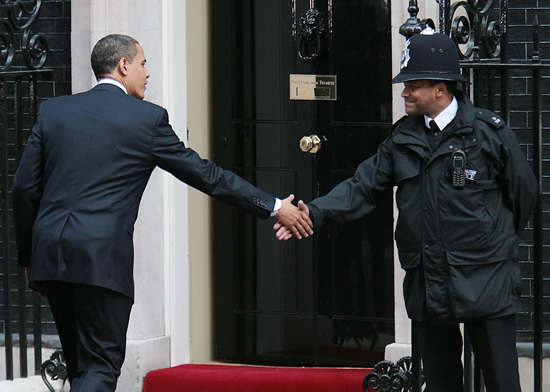Obama Administration Airbrushes Britain out of Europe
Nile Gardiner /

President Barak Obama leaves 10 Downing street after breakfast talkes with Prime Minister Gordon Brown on the morning of the G20 Summit in London 1st April 2009
Philip H Gordon, US Assistant Secretary for European and Eurasian Affairs, has just delivered a speech in Berlin outlining “the state of transatlantic relations”. His remarks, given at the Korber Foundation on January 11, are a scene-setter for the Obama administration’s European policy in “its final year in office before elections this November.” Like most pronouncements on Europe coming from the Obama presidency, it is fixated on Washington’s dealings with the European Union, as well as with Hillary Clinton’s “reset” of relations with Moscow. This is hardly surprising coming from a government that is eurofederalist in outlook and obsessed with kowtowing to the Russians at every opportunity, in some cases at Britain’s expense.
There is a good deal of boasting in Gordon’s address about the administration’s “accomplishments”, including the NATO-led operation in Libya (previously dubbed “leading from behind” by a White House aide), alliance efforts in Afghanistan (based on a coalition built by the Bush administration), and US and EU engagement with Iran “in serious discussions without preconditions regarding the international community’s concerns about its nuclear program” (which has merely bought more time for Tehran to advance its nuclear weapons programme.)
But perhaps the most striking aspect of the speech is its complete omission of America’s most important ally Great Britain, which fits in well with the words of a senior State Department official back in 2009, who insultingly told The Sunday Telegraph:
There’s nothing special about Britain. You’re just the same as the other 190 countries in the world. You shouldn’t expect special treatment.
Reading this speech, one could be forgiven for thinking that Britain doesn’t even exist in the eyes of the current US administration, airbrushed out of its assessment of transatlantic affairs. Take this section for example, which deals with the NATO mission in Afghanistan:
Our European allies have been critical to NATO’s efforts in Afghanistan. While some feared a “rush for the exits” after NATO announced the goal of a 2014 transition to Afghan lead, in fact the Alliance has held together behind the principle “in together, out together”. The United States appreciates Germany’s important contributions to the International Security Assistance Force (ISAF), providing the third largest national contingent, and its leadership of Regional Command-North. We are also grateful for its recent hosting of the Bonn Conference, which resulted in strong international commitment to remain engaged in Afghanistan beyond 2014.
Britain is the second biggest contributor to the International Security Assistance Force (ISAF), with 9,500 troops, double the number of German soldiers. Britain has lost 395 servicemen and women in Afghanistan, compared to 53 for Germany and 78 for France, and more than the total number (383) of deaths suffered by all European troop contributors combined. Unlike most of its European partners, British forces have been operating in the most dangerous warzones and without caveats restricting their deployment.
And here is what Gordon has to say about the Libya mission, without of course mentioning the fact that it was heavily driven by Britain and France, and carried out overwhelmingly with British, French and US aircraft (the Germans, significantly, opposed it):
In Libya, we cooperated closely with our European allies to pass UN Security Council resolutions 1970 and 1973, which levied sanctions against the Qadhafi regime, established a no-fly zone and maritime embargo for Libya, and provided the authority to protect Libyan civilians who were under attack by the regime. With this authorization, the U.S. used its unique assets to take down Libya’s integrated air defense system in a coalition with European Allies. Ten days later, we handed command and control of the mission over to NATO, while continuing to provide the bulk of the intelligence, surveillance and reconnaissance, in-air refueling, jamming and other critical capabilities.
As I’ve noted previously, the Obama presidency has treated Britain with indifference and contempt in some instances – the Falklands issue being a prime example – part of a broader strategy of downplaying traditional US alliances while kissing up to strategic competitors and hostile powers. It is a sad day when the most senior US official on Europe cannot even bring himself to acknowledge the vital role and huge sacrifices made by America’s closest partner on the battlefields of Afghanistan, while much of Europe barely lifts a finger in the war against the Taliban. Indeed, the Special Relationship has barely been a blip on President Obama’s teleprompter in the past three years, a damning indictment of a failed and confused foreign policy that has made America weaker and less feared on the world stage.
